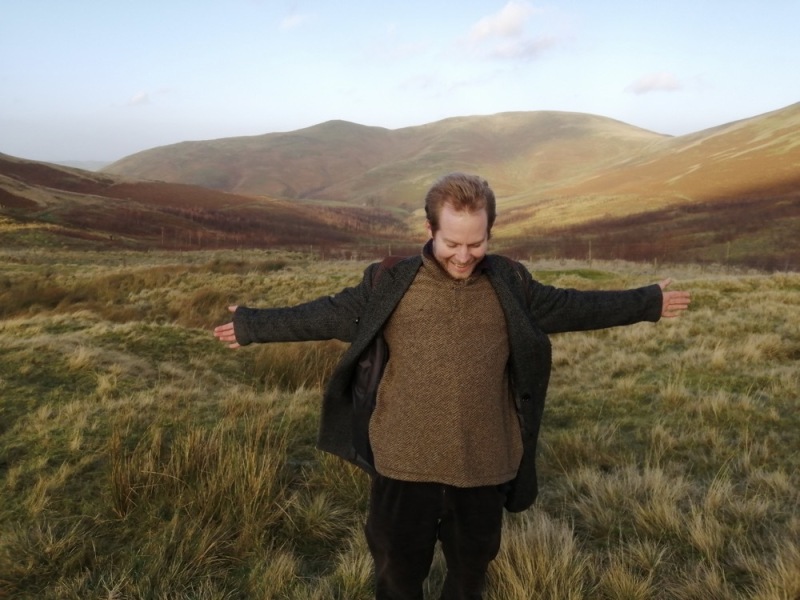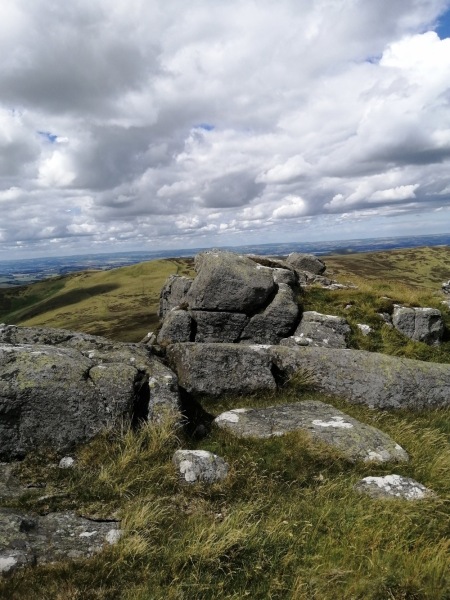Stewart Sanderson considers the notion of ‘crossing the line’ in poetry, with reference to Dante, two Child Ballads and Basil Bunting, while walking his beloved Cheviot hills
Lì si vedrà la superbia ch’asseta,
che fa lo Scotto e l’Inghilese folle,
sì che non può soffrir dentro a sua meta.
There you will see the pride which thirsts,
which makes the Scot and English mad,
so that they cannot bear to stay within their borders.
– Dante, Paradiso XIX
Starting with the lines quoted above, this Friday I want to consider several very different poems, epochs apart but all relating to one place, the Cheviot hills of the Anglo-Scottish border, which I have also sometimes tried to centre in my own writing. These texts are various – the medieval epic which supplies my epigraph, a concatenation of border ballads and a modernist touchstone. It is my hope that bringing them together like this will provide an opportunity to look again at a landscape to which I am deeply attached, as well as some of the traditions which have informed my attempts to respond to it in poetry.
Though hardly obligatory, many poets find it useful to nurse a sense of heftedness. My poetic fondness for the Cheviots comes, initially, from my family. When I was very young my paternal grandparents lived among them in the Bowmont Valley, not far from Yetholm where my granny is now. Those border hills, rugged and wild yet with a softness to them too, settled into my consciousness early. As I got older, into my late teens and the beginning of my twenties, I started walking them on my own. They became a kind of secret homeplace, to which my imagination could return to recharge itself, even when I was physically present in Glasgow or some other elsewhere.
Dante, the first poet I want to touch on, would no doubt have recognised the need to feel at home somewhere, though in his case it would probably have been a city he thought of. The Commedia is, on one level, a poem about homesickness – full of references to Florence and the clamour of its many voices.
Unsurprisingly, Dante doesn’t make many references to Scotland, or the Scots. For me, this makes the couple of points at which he does so ones to treasure. In the twentieth canto of the Inferno the reader encounters the emaciated magician Michael Scott – Michele Scotto fu. Scott, once expert in the black arts, has his head twisted the wrong way round. Tears running down through his posterior, he is condemned to be forever looking backwards, thematically appropriate punishment for one who pretended he could see into the future.
That hellish example and the extract from Paradiso XIX quoted above are, as far as I am aware, the only occasions on which Dante mentions my country. In the case of both instances, a link can be made not just with Scotland as a whole, but specifically with the Borders (the Cheviots themselves I map onto the Commedia as my own elective affinity). I find this both instinctively satisfying and provocative of further consideration. Not so much as regards the role of Scotland or the Borders in Dante’s work – which is self-evidently minimal, confined as it is to a couple of exempla which could probably have been exchanged for others without doing much violence to the overall arc of the poem. But more in terms of where, if we start from these lines, we might end up.
Dante doesn’t make many references to Scotland, or the Scots. For me, this makes the couple of points at which he does so ones to treasure
Pride – superbia – is a quality which, Dante reminds us, can lead one to transgress one’s meta. To cross the line, in other words, whether that is conceived in geographical or more abstract terms. Though their key sin is fraud, Scott and the other wizards in Inferno XX no doubt committed this kind of transgression when they looked (or said they could look) so keenly into the future. Dante was self-aware enough to recognise his own propensity to exceed the limit, as the author of one of the most ambitious poems ever written. Then again, the extent to which the Commedia lives up to its author’s ambition might arguably mean the line has not been crossed, merely moved further away. Maybe if we are imaginative enough – and lucky enough with our poems – we can keep the line moving, like a horizon we never reach however far we travel.
Walking in the Cheviot hills, it’s very easy to wander back and forth over the border without realising it. There’s a clear line on the OS map in your pocket, but it seems curiously irrelevant when you’re concentrating on the contours of the next ridge, or half-jumping from tussock to tussock in a patch of boggy ground. Near the top of the Hen Hole – a ragged scar of rock in the side of the eponymous Cheviot – there are the remains of what seems to be an old shieling. It’s a bit tumbledown now, but still puts a line of dry stone between your body and the wind. That crumbling wall is, unlike the imaginary division cutting through the hills, immediately apparent; a scrap of shelter in which to eat a sandwich before tackling the last expanse of gradually inclining moorland which leads to the summit. Sitting there, you can sometimes make out a bit of the North Sea, plus what feels like practically the whole Scottish borderland – what used to be called the Eastern March – all the way to Soutra Hill not so far south of Edinburgh. You are, incidentally, in Northumberland, a line having been crossed at some point, a limit exceeded.
Maybe if we are imaginative enough – and lucky enough with our poems – we can keep the line moving, like a horizon we never reach however far we travel
The next poems I want to look at have a less fanciful link with the place: Child Ballad 161, ‘The Battle of Otterburn’ and Child Ballad 162, ‘The Hunting of the Cheviot’. Both these ballads refer to the same fourteenth-century event, in which the Scottish commander, Sir James Douglas, was killed and the English commander, Sir Henry Percy (Shakespeare’s Hotspur), captured. In true ballad style, ‘The Hunting of the Cheviot’ has Percy dying too, a historical inaccuracy which makes for memorable poetry:
There was never a tym on the marche partes
Sen the Douglas and the Persè met,
But yt was marvale, and the redde blude ronne not
As the reane doys in the stret.
The true marvel in these lines is, I think, the simile with the rain in the street: one of those little comparative flashes of reality which, it has been suggested, are Dante’s secret subject too. There are similar flickers of the real in ‘The Battle of Otterburn’, locating the song in a verifiable place and time – the reference to the “Lammas tide,/ When the muir-men win their hay” with which the poem begins; the “bent sae brown” on which the armies assemble. And, above all, the “braken-bush” under which the Scots bury the dead, victorious Douglas, to which Percy is urged to surrender at the song’s end.
Existing contingently, in multiple surviving versions, these retellings of the battle of Otterburn can also be considered from the point of view of crossing Dante’s meta – notably the border which the Scots cross to raid into Northumberland, but also in more abstract, ethical and aesthetic senses. Taking conscious or unconscious liberties with the facts in the interests of a good story, did the original oral composers of these songs cross a line? What about the later collectors who printed them and others like them, often making distinctly authorial interventions in their presentation of the text? Had the dividing line between spoken word and printed page not been crossed, of course, both ballads would likely have been lost to posterity. Coming across bracken bushes, not so far away from the battle site, I might see nothing but ferns, the idea of surrendering to which might never occur to me.
Successful poems may often be those which, in one way or another, open up more capacious reservoirs of potential energy than they drain in the process of their own coming into being
Whatever choices a poet makes, consciously or unconsciously, there is always loss as well as gain. Some possibilities must be rejected so that others can be realised. Successful poems may often be those which, in one way or another, open up more capacious reservoirs of potential energy than they drain in the process of their own coming into being.
The last poem I want to make specific reference to here is Basil Bunting’s ‘Attis: Or, Something Missing’, whose emasculated narrator remembers:
There was soft rain.
I recollect deep mud and leafmould somewhere: and
in the distance Cheviot’s
heatherbrown flanks and white cap.
Cheviot and its eponymous range of hills have mostly been like this for me – an image of heatherbrown flanks recollected, or glimpsed from afar as the car rounds a corner or I get to one of the other Border summits. Bunting is looking from the other direction and, looking south from Peniel Heugh, say, it’s nice to think I might catch the after-image of his eye. One of the many things he offers his readers is an invaluable synthesis of the internationally curious, high modernist moment and a particular, northern locality. Dante and the Border ballads at once, as it were, with a simultaneous determination to be of the contemporary moment, though hardly limited to it. And indeed, one thing all the poems I have touched on this Friday have in common is that they have, in their various ways, transcended the confines of the specific historical moments which produced them. Maddening as poetry can be, that ongoing ability to excite and enthuse is, I think, something all those who have participated in it can take a certain pride in. The same is true of hills, which aren’t just geological, but also cultural formations, whose contours are always shifting underneath our feet.



